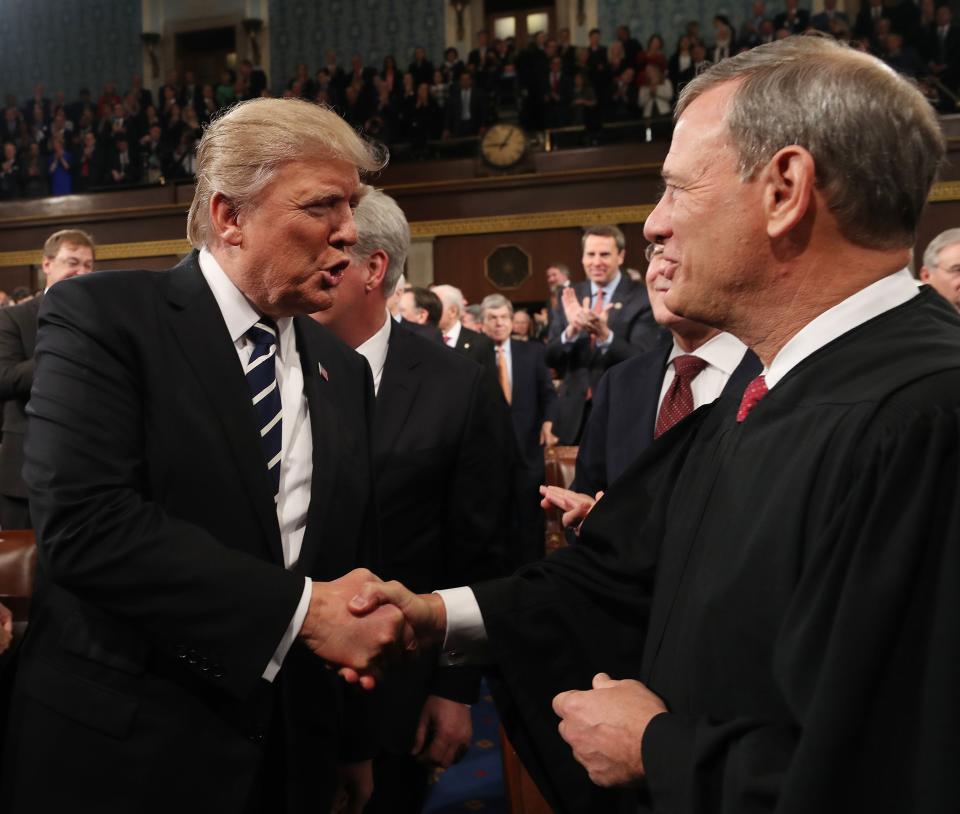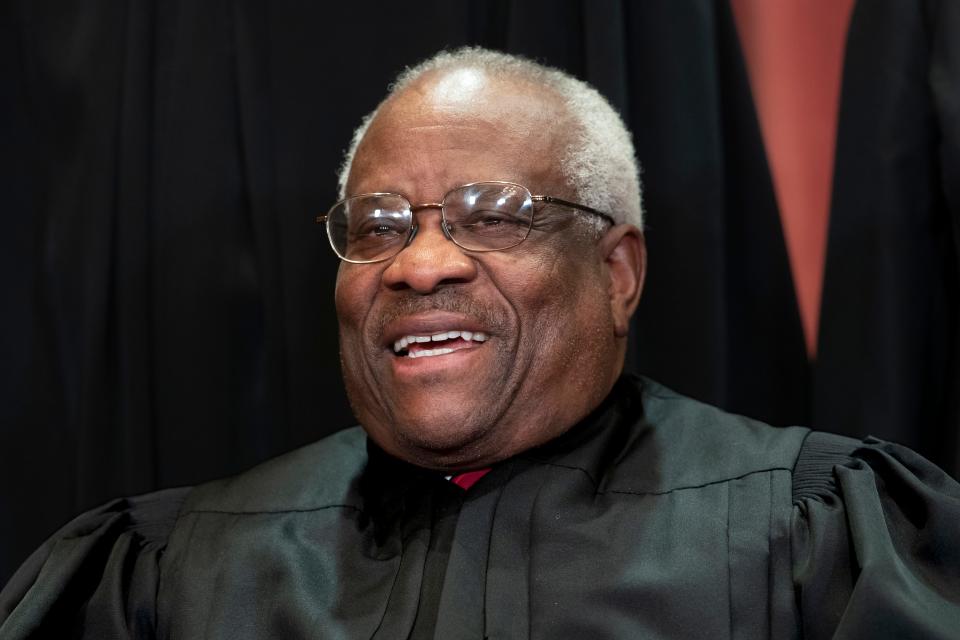Supreme Court justices don't have a code of ethics. Hundreds of judges say that's a problem
- Oops!Something went wrong.Please try again later.
- Oops!Something went wrong.Please try again later.
Hundreds of judges across the United States said U.S. Supreme Court justices should be bound by a code of ethics – and many said they were shocked to find out that wasn't already the case.
The National Judicial College surveyed judges across the nation on whether the Supreme Court should be held to a higher standard. The survey came amid a contentious and high-profile U.S. Supreme Court calendar that has involved questions of bias, as well as investigations into Supreme Court Justice Clarence Thomas' family ties to the Jan. 6, 2021 insurrection at the U.S. Capitol.
The Supreme Court is expected to announce more than a dozen decisions in the next few weeks, including on abortion, guns, immigration and the environment. A majority of Americans – about 55% – said they disapprove of the job the highest court is doing, according to a Marquette Law School national poll in May. Americans' opinions on the court have dropped significantly from 58% approval in a Gallup poll in July 2020 to 40% in September 2021 – the worst Gallup has measured in its polling on the nation's highest court in more than two decades.
Meanwhile, the ongoing Jan. 6 committee hearings have highlighted the alleged efforts by Virginia "Ginni" Thomas – a longtime conservative activist married to Justice Thomas – to help overturn the 2020 election. Justice Thomas chose not to recuse himself from a case about whether President Donald Trump's White House records should be turned over to the committee. The January decision was nearly unanimous: Only Thomas disagreed.
Since then, news outlets have reported that Ginni Thomas sent text messages to Trump's chief of staff, Mark Meadows, and emails to Trump campaign attorney, John Eastman, as part of her alleged efforts to try to overturn the 2020 election.

More than 97% of the judges roughly 860 judges who responded to a June survey by the judicial college, a nonprofit and nonpartisan institution that educates judges of all types from all over the country, responded "yes" to the question of whether the justices should be bound by a code of conduct, while nearly 3%, or 24 judges, said "no."
Surveillance state: How data might be used to jail women under new abortion laws
Many of those who said yes used the word "absolutely" as a comment, often in caps, and one wrote in caps and used 29 exclamation marks. One person said "duh" and another called it a "no-brainer." Among the "yes" votes, 11 people brought up Clarence Thomas or Ginni Thomas.
Of the 24 judges who voted no, two added in comments that they assumed that the justices as lawyers would be bound by ethics required of them as attorneys. But according to the U.S. constitution, a justice does not have to be a lawyer or attend law school to become a Supreme Court justice.
One judge who voted "no," said, "The constitution alone should set the parameters" and another said "Hands off the SCOTUS. There are some things that we shouldn't even entertain." Multiple others felt like enforcement would be the greater issue.
Many of the judges were unaware that Supreme Court justices were not bound by any code of ethics – despite being bound by one if in the judiciary prior – and were surprised to learn otherwise.
Judge Michael Mery of the 144th Judicial District Court in Bexar County, Texas, said he thought the question initially was an esoteric exercise but said he was "highly, highly shocked" to learn U.S. Supreme Court justices aren't bound by an official ethics code other than what they might voluntarily adhere to. He said he's spent his career ensuring he doesn't even create an appearance of impropriety, which can stand in the way of achieving justice.

"They should be setting the bar for the rest of us. We should strive to emulate them," said Mery, 64, who has been a judge for 23 years and lawyer for 17 years prior.
Circuit Judge John M. Torrence of the 16th Judicial Circuit Court of Jackson County, Missouri, said the fact that the question had to be raised "demonstrates the absurdity of the current situation."
"Of course they should be bound by the same judicial ethics rules as the rest of the judiciary," Torrence said. "They are the leaders. They should lead. And they should stop dodging a code of ethics that does nothing more than maintain a minimal sense of dignity, responsibility and respect amongst members of the judicial branch and the public we serve."
There are several federal statutes that do apply ethical requirements to justices of the Supreme Court, including one that requires recusal from certain cases where a judge or justice "has a personal bias or prejudice concerning a party" or a "financial interest." Still, there is no real enforcement mechanism beyond self-policing and the more extreme measure of Congress moving for impeachment and removal of a justice, which is unlikely given partisan gridlock. Only one justice has ever been impeached by the House, and he was acquitted by the Senate in 1805.
Congress has also directed justices to provide financial disclosures like other federal officials, though there have been multiple instances when a justice failed to do so. For example, in 2016, Justice Sonia Sotomayor omitted from her disclosure that a public university paid for as many as 11 rooms for her in a fancy hotel.
But not everyone said the court should be held to task for ethical lapses.
In an interview with USA TODAY, Darke County, Ohio Common Pleas Court Judge Jonathan Hein said he opposed the ethics code because it would be "weaponized against the Supreme Court."

Hein, 66, who served as a judge for 24 years and an attorney, including elected prosecutor 18 years prior, said he wasn't opposed to the idea of a code of ethics, but that enforcement would easily become injected with politics unless it was "self-policing and anonymous."
"Just because somebody talks down about the presidency doesn't mean that's how they voted," Hein said. "We should all accept the fact that they are human too."
Even the code itself should be confidential, Hein said, to avoid ongoing attacks against the court and its legitimacy, but there could be an anonymous report out to the public annually about whether complaints were made.
"They have to hold themselves accountable to their peers," Hein said. "That means they have to face themselves, their own credibility, which is their intellectual capital. They try to persuade each other."

Many judges, however, said adhering to a code of ethics would help improve how people view the judiciary.
In Texas, Mery said he has seen a massive change in how the public views the judiciary over the last 40 years. He said people used to hold judges in high esteem and respect their decisions, believing they made them for good reasons even if they disagreed with them.
"Now you see people with no hesitation to criticize judges, even fellow elected officials," Mery said. "We have suffered a lot lately. The past several years for sure. The public needs to have confidence in the judiciary as a whole, as a branch of government. And the Supreme Court is the symbol for all of us."
Gabe Roth, executive director of Fix the Court, a New York-based nonpartisan judicial watchdog, said the first step is setting up an aspirational ethics code that sets parameters on behavior in and out of the courtroom on a daily basis; for example, don't go to a fundraiser or political rally. Then, he said, there can be discussions about what mechanisms are permissible under the constitution to bring an even greater level of accountability.
His organization has counted dozens of ethical lapses by Supreme Court justices since at least 2000.

"To me, the Supreme Court has this outsized power," Roth said. "Congress is paralyzed, Congress and the presidency don’t work well together. So the most important decisions being made in our country are not being done by our elected representatives or our elected president and his emissaries, they're being made by nine unelected judges in Washington. If that’s the case, then at the very least we should want to have those officials held to the highest possible ethical standards."
Like Roth, many experts who spoke to USA TODAY said that just because there isn't a body that would enforce the ethical code for the U.S. Supreme Court isn't in and of itself a reason not to have one.
"The first line of enforcement is self-enforcement," said Keith J. Bybee, vice dean at the Syracuse University College of Law in New York. "When you're bound by a code of ethics, it leads you to ask questions about your own activities, and to achieve impartiality through a process of question asking."
Bybee said the public sense that there should be an ethical code for justices has grown more pronounced over the last decades because now all the conservatives on the court were nominated by Republicans and the more liberal members by Democrats. That wasn't the case during the years Sandra Day O'Connor or Anthony Kennedy, who were notorious ideological swing votes nominated by Republican President Ronald Reagan, sat on the court.
"The split in judicial philosophy maps perfectly into a partisan split," Bybee said. "So as a result, it's easier to read decisions on the court as a partisan one."
With increasing amounts of dark money flowing into confirmation battles and a lack of a code of ethics, it's important to ensure peoples' faith in the judiciary isn't further eroded, experts said.
The Judicial Crisis Network, a nonprofit advocacy group that ran campaigns to elect Trump's high-court picks and other lower, federal court judges, has also spent millions supporting evangelical and anti-abortion groups, and other conservative groups or causes including ads warning about court-packing, according to Robert Maguire, research director for the ethics watchdog group Citizens for Responsibility and Ethics in Washington. The Judicial Crisis Network has raised $48.1 million between July 2020 and June 2021 from secret donors, nearly all from two anonymous eight-figure contributors, Maguire said.
Ethics:Supreme Court Justice Clarence Thomas, other justices ethics questioned at hearing at hearing
Some of the objections raised over the years to having a code of ethics has been the concept of separation of powers – the idea, in this case, that Congress isn't supposed to interfere with the court's operations.

But Douglas Keith, a lawyer with the Brennan Center for Justice in New York, said Congress would not be interfering with the court's decision making.
Members of Congress have tried repeatedly over the years to introduce bills that would put in place a code of ethics, Keith said, and have done so again this session. Some of the proposals before Congress involve requiring justices to explain in writing a decision around not recusing themselves for a conflict of interest, or creating a body that would make a non-binding assessment of whether a justice should recuse his or herself from a case, Keith said.
In the Ginni Thomas example, Keith said that under any other political environment as mundane a fix as a code of conduct would be "noncontroversial."
"There are prior generations that would be shocked by our inability to respond to these facts with any meaningful congressional response," Keith said. "It's just a sad statement about where we are at this moment."
This article originally appeared on USA TODAY: Supreme Court justices should be bound by ethics code, US judges say

